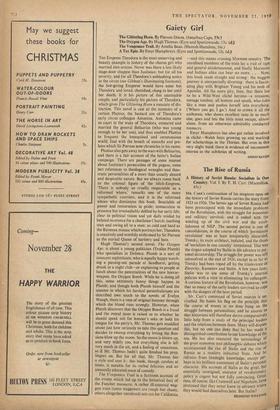The Rise of Russia
MR. CARR'S continuation of his magnum opus on the history of Soviet Russia carries the story from 1923 to 1926. The heroic age of Soviet Russia had been preoccupied with the immediate problems of the Revolution, with the struggle for economic and military survival; and it ended with the winding up of the civil war and the estab- lishment of NEP. The second period is one of consolidation, in the course of which 'permanent revolution' was at least temporarily discarded, Trotsky, its main architect, isolated, and the thesis of 'socialism in one country' introduced. This was the slogan adopted by Stalin in his advance to per- sonal dictatorship. The struggle for power was still unresolved at the end of 1926, except in so far as Trotsky had been roped off by the triumvirate of Zinoviev, Kamenev and Stalin. A few years later, Stalin was to use some of Trotsky's internal policies with a view to eliminating his colleagues. A curious feature of the Revolution, however, was that so many of the early leaders survived to cope with the dangers of the later period.
Mr. Carr's command of Soviet sources is un- rivalled. He hoists his flag on the principle that the course of events at no time hung on the struggle between personalities, and he assures Its that historians will therefore derive comparatively little help from a study of the principal leaders and the relations between them. Many will dispute this, but no one can deny that he has made a distinguished contribution to our knowledge of the era. He has also mastered the terminology of the great economic and philosophic debates which accompanied the rise of Stalin and the rise•of Russia as a modern industrial State. And he refrains from hindsight knowledge, except per- haps in his brilliant assessment of Stalin's personal character. His account of Stalin as the great, but essentially unoriginal, executor of revolutionary policy is cogent but not fully convincing. Great men, of course, like Cromwell and Napoleon, have professed that they never knew in advance where they would find themselves later. But Stalin?
DESMOND WILLIAMS














































































 Previous page
Previous page